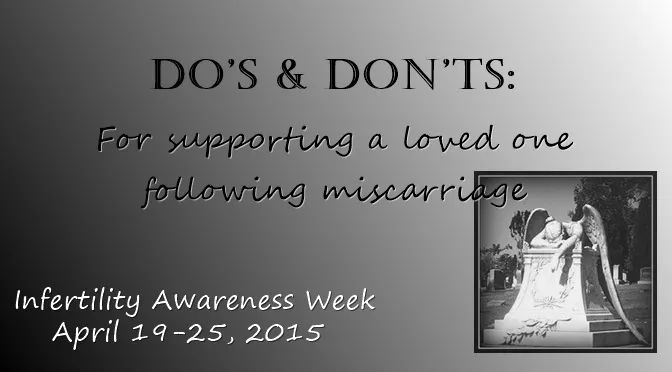
Do’s & Don’ts for supporting a loved one following miscarriage
A miscarriage is a devastating experience all in its own. It's an experience you hope to never have and one you certainly wouldn't wish on another. April 19-25, 2015 is National Infertility Awareness Week, so today I'm sharing with you things I’ve learned as I’ve battled infertility and a subsequent miscarriage. Things to help my fellow moms in the trenches and those on the outside looking in, unsure of how to be there or handle these situations with a friend or family member - the do's and don'ts for supporting a loved one following miscarriage.You Are Not Alone
- Taking time away - When going through your experience, it's okay to tuck yourself away for a while. Take your time to grieve. Eventually though, release yourself from that seclusion. I found that getting out, talking and opening up really does help.
- Letting people in - The day I found out my baby had passed away, my closest friend came over with a bag of chocolate and her shoulder to cry on. At this point, that was exactly what I needed. She didn't talk, she just listened.
- Trusting your truth - After opening up, do not let anybody tell you how to feel about this. It's okay to be mad, to scream and to cry all you want. This is your rollercoaster to ride out however you choose.
- Reaching out - Lastly, I recommend you seek out help. I chose to talk with our Pastor. A therapist, doctor, even some online support groups are excellent resources. It's important to remain open and communicate with others about how you’re feeling. You will never heal if you don't talk. Finally and most importantly, remember, this was not your fault!
Friends & Family
I found that this can be an incredibly awkward situation for friends and family to handle - many simply don't know what to say, so they say nothing, which can be isolating. Some of my friends chose to ignore me. Family chose to smother me - in their own loving way of course. The thing I found to be most upsetting was the inappropriate comments people would make. I don't blame them. It is a difficult situation and one that many don't talk about. If you find yourself in the position to help a friend or family member through a loss, these are just a few do's and don'ts I would suggest:
DO
- Be available to them.
- Remember that a loss is a loss and everyone grieves differently. Your friend is entitled to her feelings during this situation.
- Check in. A simple text asking how her day is. A call to say you’re thinking of them (this is happening to dad too, after all), or even stopping by to see if they need anything.
- Encourage her to get out of the house, if she’s up for it. Go for lunch, coffee or even a little retail therapy.
- Ask questions, but take your cues from her – let her set the pace. Asking questions shows your friend you care about what she is dealing with.
- A token to remember their baby by. No matter what stage they lost their baby at, this was still their child and any reminder is precious to them.
- A card or even flowers on Mother’s Day. Their child may be gone, but she is still a mom.
- Continue to be there and present after the initial months of support have tapered off.
- Allow them to grieve openly and honestly.
- Seek out your own online support group. There are a lot of resources available online to friends and family helping a loved one through this loss.
- Take over a meal.
- Pray with them,
- Pray for them.
DON'T…
…close yourself off to them. Ignoring them or downplaying their feelings is hurtful.
…say, "It's better it happened now rather than later."
…say, "The baby must have had something wrong with it." Even if it's true, it still hurts.
…say, "Well at least you weren't very far along." No matter when it happened, this was still their child and a loss is a loss.
…offer to help them unless you truly mean it. The last thing they need is someone making promises and not following through.
…forget about the Dad! Both parents are going through this and both will need some kind of support.
…say, "I know just how you feel." and begin describing a story of loss of someone you know.
…compare their grief to your own loss of someone or something. No two losses are the same so let them be entitled to their grief.
* * * * * * *
Finding Support:
- Rainbow Pregnancy Loss and Infant Death Support Group meets the first Thursday of each month in Billings, 7-9pm. More information: Molly, 406-248-3487 or Traci, 406-855-4439.
- The Compassionate Friends: Billings Chapter - The Compassionate Friends (TCF) is a national non-profit, self-help support organization offering friendship, understanding, and hope to families grieving the death of a child of any age, from any cause.--TCF National Organization. Click here for their Billings calendar of meetings/events.
- Share - Pregnancy & Infant Loss Support, Inc.- Their mission is to serve those whose lives are touched by the tragic death of a baby through early pregnancy loss, stillbirth, or in the first few months of life. http://nationalshare.org/
About the author…Born in Wyoming, and raised primarily in Montana, Kayla resides with her  husband Jason and three step-children Anyah, Jesse and Alex. When not on the go with active kids, Kayla works full-time at Sheridan Memorial Hospital and attends Northern Wyoming Community College for Nursing. She truly enjoys the time she has to spend with new family and most recently the opportunity to return to her passion of writing and share her story.
husband Jason and three step-children Anyah, Jesse and Alex. When not on the go with active kids, Kayla works full-time at Sheridan Memorial Hospital and attends Northern Wyoming Community College for Nursing. She truly enjoys the time she has to spend with new family and most recently the opportunity to return to her passion of writing and share her story.
